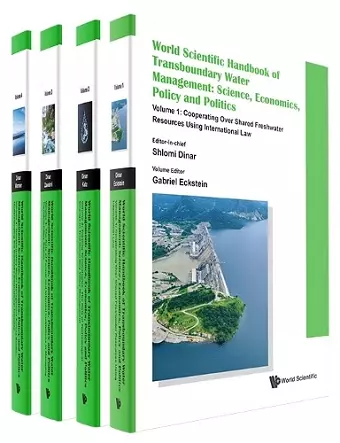World Scientific Handbook Of Transboundary Water Management: Science, Economics, Policy And Politics (In 4 Volumes)
Format:Hardback
Publisher:World Scientific Publishing Co Pte Ltd
Published:13th Mar '25
£875.00
Supplier delay - available to order, but may take longer than usual.

The impacts of population growth, climate change, and water scarcity and variability on a country's economy or society, in addition to the sheer need to harness international rivers for domestic and regional purposes, have made the management of transboundary freshwater a subject of great import. Over the past several decades, research in various disciplines utilizing a variety of methodologies has explored these issues, focusing on freshwater's strategic importance as well as conflict, cooperation, and negotiation over shared water bodies (rivers, lakes, aquifers).This multi-volume set seeks to contribute to this still burgeoning body of literature by focusing on several key themes that can help explain and recognize successes and failures in transboundary freshwater management. In particular, the set seeks to bring together original scholarship focusing on international law, technology, institutions (formal and informal), and the interplay of domestic and international affairs. Each edited volume in the set aims to build on extant research while also fostering new paths of inquiry. Overall, the set seeks to become a guide for both academics and practitioners hoping to better understand the joint management of this precious natural resource from socio-political, legal, economic, and technological perspectives.Volume 1 explores international law for shared freshwater resources — both surface and subsurface waters — from a multidisciplinary perspective. It explains the role of international water law (IWL) (and/or specific norms) within particular contexts/case studies and critically examines that role and its relative success (or failure) in achieving the intended objectives.Volume 2 explores the roles of, and limitations of, technologies and their applications in the management of transboundary water and wastewater. It presents case studies and legal, and political analyses that focus on the potential or actual roles and implications of the technologies in transboundary policy and management, rather than detailed explications of the technologies themselves.Volume 3 contributes to the growing literature seeking to understand how, when, and if institutions (broadly defined) impact states' abilities to address their joint water disputes. The volume presents a combination of single, comparative, and empirical analyses of cases across the world about the role of institutions in facilitating collaboration over transboundary water resources and mitigating conflict.Volume 4 seeks to make sense of the interplay of domestic, transnational, and international dynamics in explaining conflict and cooperation over water through single or comparative case studies as well as analyses of on-the-ground transboundary water management experiences arising from these complex political dimensions.
ISBN: 9789811299858
Dimensions: unknown
Weight: unknown
1284 pages